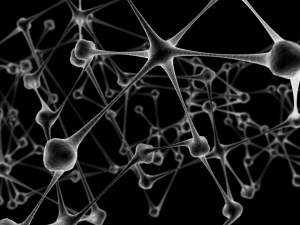
Recently someone asked (paraphrase): “I’ve been praying to God for help to overcome my addiction. Why hasn’t He helped me to do it?”
This question is not uncommon and reveals some problems with the way that we think about sin and how God works in our lives to enable us to overcome the power of sin. To understand this it is useful to first define what an addiction is. An addiction is any action/practice or sequence of actions/practices that is repeated enough that a permanent (but not necessarily irreversible) change in the brain architecture of the addicted occurs in order to perpetuate the action/practice. Addictions can range from thumb-sucking to drug-abuse, from workaholic-ism to pornography.
Generally, addictions are only overcome when a new agent hierarchically replaces the importance of the addiction in the mind of the addict: when a competing structure develops. Even when this happens, the neural-network associated with the addiction does not disappear immediately: it takes time for the brain to gradually re-organizes its structure. Hence, the likelihood of relapse is an ever-present danger for many.
The key to overcoming addictions and potential relapses is the strength and constancy of the new agent neural-network. As long as the neuronal pathways of the new agent fire more strongly and consistently than that of the addiction, then the addict is in good position to overcome his/her addiction.

For example, kids usually stop sucking their thumbs when social pressures related to the habit and to the resulting orthodontic damage supersede any comfort they got from it. Likewise, some drug abusers are “scared straight” by the fear of dying from the drug use. Fear of death overrides the neural-network of the addiction, thereby allowing them to quit.
It is true that more people are addicted to various actions than they might realize. This unawareness arises because people mostly only consider socially unacceptable habits as addictions. More important, however, is to realize that ALL addictions are sins, because they are, by definition, the antithesis of self-control and the Christian is commanded to bring his/her entire body under the control of the Holy Spirit (1 Corinthians 9:24-27).
The essential difference between addictions and “regular” sins, is that addictions are sins that have become “hardwired” in the brain with an associated reward (usually dopamine) to reinforce the behavior. But, as will be argued below, the cure for addictions and non-addiction sins is the same: Love for God must grow in us (in our minds) until it is preeminent. That love for God will then overwhelm the addiction network as well as all other desires to sin.
That thou mayest love the LORD thy God, and that thou mayest obey his voice, and that thou mayest cleave unto him: for he is thy life, and the length of thy days… ~Deuteronomy 30:20a
Finally, we must avoid conflating salvation with the absence of addiction. Only God determines who is saved (addiction or not). Moreover, the Scripture makes it clear that sinlessness is neither a prerequisite for salvation nor sanctification. That means some Believers might be in bondage to unsavory addictions. However, while we should always clearly and unequivocally declare addictions (unsavory or not) as sin, we cannot refute the work of God in the addicted.
Some of us have further to go than others. And, the person addicted to food should never look down on the person addicted to drugs. Indeed, both are listed together as heading for the same end:

For the drunkard and the glutton shall come to poverty: and drowsiness shall clothe a man with rags. ~Proverbs 23:21
Let us, therefore, examine the Proper Perspective for sin, the Prescribed Procedure to overcome sin and God’s Precious Promise to never give up on us.
THE PROPER PERSPECTIVE
First, the question (above) suggests that the addiction is a bigger sin than the other sins that we (including the questioner also) all struggle with. Certainly, if God took addictions from all of our lives it is unlikely that any of us (including the questioner) would be perfect. More pointedly, eliminating addictions of any sort, does not guarantee that we will draw closer to God’s and walk in obedience.
The problem here is the perception that some sins, such as addictions, are worse than others. This notion implies that if I get rid of some “bad”, really “ugly” sins then I will be a better person; even though the “not-so-bad”, “not-so-ugly” sins remain. But, that is not God’s calculus. Romans 14:23b tells us that sin is anything that is not done in a faith response to God.
…for whatsoever is not of faith is sin. ~Romans 14:23b
And, Romans 6:23a tells us that all sin has the same punishment.
For the wages of sin is death… ~Romans 6:23a
So, we must deduce that ALL sins are equally offensive to God.
Therefore, God’s ultimate purpose is not to excise the “uglier” sins (such as addictions) while the “not-so-ugly” sins remain. His purpose is to enable us to overcome ALL sin. And to accomplish this, Romans 12:1-2 tells us that we should offer ourselves to God and allow Him to transform us, by the renewing of our minds. Only then will we know His will and have the power to walk in it: the power to overcome ALL sin!

I beseech you therefore, brethren, by the mercies of God, that ye present your bodies a living sacrifice, holy, acceptable unto God, which is your reasonable service. And be not conformed to this world: but be ye transformed by the renewing of your mind, that ye may prove what is that good, and acceptable, and perfect, will of God. ~Romans 12:1-2
Accordingly, God focuses on the state of our ‘minds’, i.e., our mindset, rather than any specific sin. God intends to change our entire attitude to sin, so that we will choose His way instead of going our own way.
God sent The Holy Spirit to indwell our lives in order to change the way we think about life: to replace our values with God’s values. Therefore, we must constantly ask ourselves: “Am I beginning to look at life through God’s eyes?”; “Do I delight in the things that please God?”
If I overcome an addiction but my mindset is unchanged then I have not benefitted, because sins (even if they don’t look as “ugly” as an addiction) are still rampant in my life. On the other hand, as God transforms our minds, all the sin-strongholds in our lives are likewise weakened.
To be clear, God is NOT ‘comfortable’ with an addiction or any other sin: God hates sin! And that’s why His purpose is to overcome ALL sin, in your life and in my life.
THE PRESCRIBED PROCEDURE
Overcoming sin, even addictions, does not occur magically. Moreover, God never forces us to obey Him; He gave us free will. However, God will always lead us to a point where we choose to change.
Have mercy upon me, O God, according to thy lovingkindness: according unto the multitude of thy tender mercies blot out my transgressions.
Wash me throughly from mine iniquity, and cleanse me from my sin.
For I acknowledge my transgressions: and my sin is ever before me.
Against thee, thee only, have I sinned, and done this evil in thy sight: that thou mightest be justified when thou speakest, and be clear when thou judgest. ~Psalm 51:1-4
However, we Christians often want God to override our wills. We want God to take away enough of our freedom of choice so that decisions are “easier” to make. We want, somehow, not to have to make the decision not to sin: we want God to make that decision for us, to have Him force His will on us.

In other words, we want God to treat the symptoms instead of the disease. The disease is a heart (mind) that is not completely yielded to God. And sins, all types of sins, are the symptoms. As a good doctor would, God intends to treat the disease so that the symptoms will end. God will not remove our sins and leave behind un-yielded hearts. Indeed, it’s our heart that He is after.
Thus, we should stop our preoccupation with ‘ugly’ sins (like certain addictions) and instead seek to draw ever closer to God to enable our ‘mental’ transformation to accelerate. To that end God has given us these keys for success:
Thy word have I hid in mine heart, that I might not sin against thee. ~Psalm 119:11
By mercy and truth iniquity is purged: and by the fear of the LORD men depart from evil. ~Proverbs 16:6
First, it is the word of God (the truth of God) in our hearts that washes sin out of our lives. As we study, memorize and meditate on His word, under the influence of the Holy Spirit, it renews our mind. As we orient our lives according to the Scripture, as we base our lives on His commands, we are able to overcome sin, because we are walking in daily fellowship with our God.
Second, we must accept His mercy. Accepting God’s mercy is not being presumptuous. Presumptuousness arises when we demand/expect God to sanction our plans; when we tell God what to do. To accept God’s mercy is to acknowledge our inadequacy. It is to realize that our transformation, from a self-focused mindset to a God-focused mindset, is slow and sometimes painful BECAUSE of our weakness.
It is the combination of God’s mercy, as He patiently works with us, and His Word, as it transforms our mindset, which ultimately breaks the power of sin over our lives.
Therefore, we do not draw back or hide from God when we fall into any sin; neither the ‘ugly’ ones, nor the not so ‘ugly’ ones. God instructs us to confess our sins, not hide from Him (like Adam and Eve, Genesis 3:8). He then MERCIFULLY promises to forgive us (1 John 1:9) and continue the transformation process in us (Philippians 1:6).

We must never allow the devil to separate us from God. The closer we draw to our Father, the faster our transformation and the sooner our victory over all forms of sin, even the uglier-looking ones!!! We should take courage, continue to walk with God and continue to allow Him to change us. We must journey deep into God’s word and fellowship with Him, even when we are discouraged.
THE PRECIOUS PROMISE
Finally, let us always remember
Being confident of this very thing, that he which hath begun a good work in you will perform it until the day of Jesus Christ. ~Phil. 1:6
If God has started the transformation process in us, He won’t stop working (even if He has to use with trials to get it done).
God won’t quit on you… so don’t quit on yourself!!!
.
————————————————————————————————
Reflections-in-the-WORD would like to thank INSPIKS for inspiration and for insightful comments on this topic.
